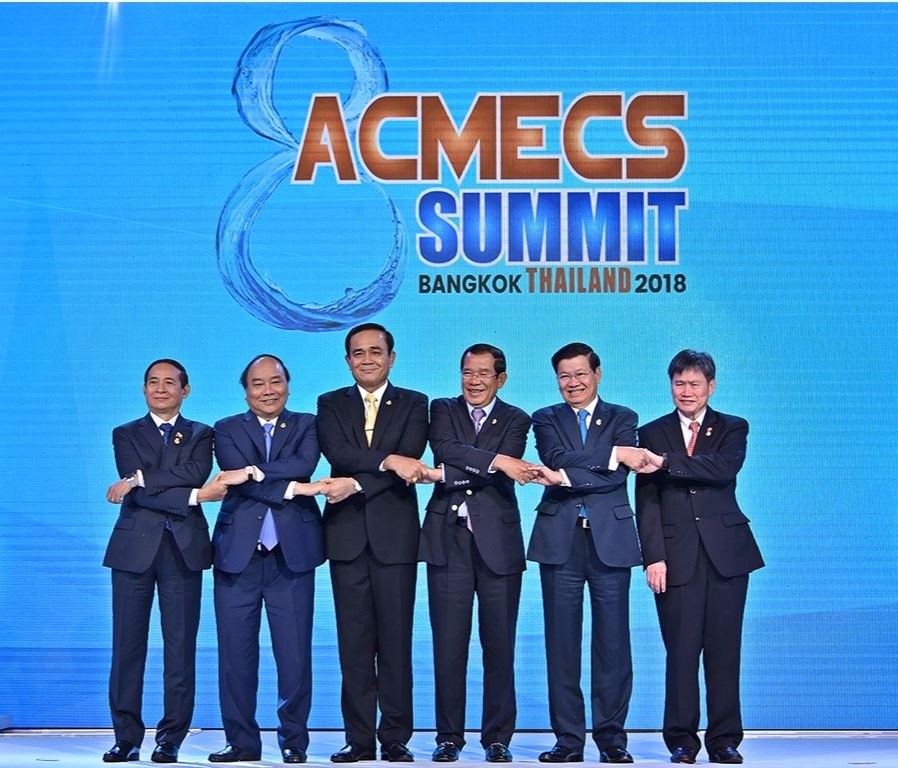ADB Confirms Support to ACMECS

Thailand was the host of the 8th ACMECS Summit, which was attended by (from left) Myanmar President U Win Myint, Viet Nam Prime Minister Nguyen Xuan Phuc, Thailand Prime Minister Prayut Chan-o-cha, Cambodia Prime Minister Hun Sen, Lao People's Democratic Republic Prime Minister Thongloun Sisoulith and ASEAN Secretary-General Lim Jock Hoi. Photo courtesy of the Ministry of Foreign Affairs, Thailand.
Asian Development Bank President Takehiko Nakao reaffirmed ADB's support to the Ayeyawady-Chao Phraya Mekong Economic Cooperation Strategy in a video message shown at the 8th ACMECS Summit [2] on 16 June in Bangkok.
Thailand was the host of the summit, which was attended by the prime ministers of Cambodia, Lao People’s Democratic Republic, Thailand, and Viet Nam, and the President of Myanmar.
President Nakao cited the countries' efforts to create seamless cross-border connectivity, integrate regional value chain into the global value chain, and strengthen private sector participation, which are critical in sustaining economic growth across the ACMECS subregion.
In addition to country programs, he said ADB will help leverage support for the ACMECS countries through the Greater Mekong Subregion Regional Investment Framework 2022 [6], which has a pipeline of projects in ACMECS countries valued at $41 billion.
At the ACMECS CEO Forum on 15 June in Bangkok, Director General Ramesh Subramaniam of ADB’s Southeast Asia Department said, “ADB is committed to advancing cross-border connectivity and development in ACMECS.” He said cross-border connectivity (e.g., roads, railways, power grids) is important to ACMECS as well as to the Greater Mekong Subregion (GMS), which also includes the five ACMECS countries.
Enhancing ‘software’ connectivity
“Both ACMECS and the GMS also attach a great importance to the development of policy and institutional measures—or the ‘software’ that complements and maximizes the benefits of these hardware investments,” Subramaniam said. He highlighted some opportunities for ACMECS to develop the software to support regional connectivity further in collaboration with the GMS.
To promote seamless cross-border mobility, he said ACMECS countries need to focus on promoting logistics development, enhancing the effectiveness and relevance of the GMS Cross Border Transport Facilitation Agreement [4] to current practices, and strengthening the institutional structure for trade facilitation.
To strengthen regional value chains, he said the GMS Program and ACMECS could work together in the following areas:
- Planning and developing strategically located economic centers in both urban areas and border areas;
- Developing harmonized standards, practices, and policies to facilitate production, trade, and investment for regional value chains;
- Improving systems for generating and sharing knowledge and innovations related to the development of regional value chains; and
- Promoting ACMECS as a major supplier of safe and environmentally friendly agriculture products through the development of inclusive and sustainable agro-value chains [3], business and investment reforms, and financial services.
To better support private sector development, Subramaniam said the ACMECS economies could focus on policy and institutional measures to improve the business environment; providing incentives for foreign firms to partner with domestic suppliers; strengthening regional platforms such as the GMS Business Council, the GMS Freight Forwarders Association, and the Mekong Business Initiative [7]; and creating innovative financing modalities and developing public-private partnerships to promote private sector involvement in major infrastructure and development projects.
“To this end, the proposed establishment of the ACMECS Trust Fund and ACMECS Infrastructure Fund [2] is very encouraging,” he said.
Last Updated: 21 June 2018
